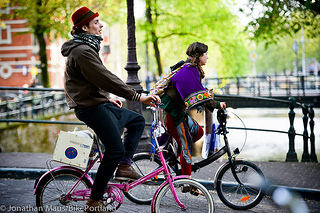Today’s Monday Roundup is sponsored by Portland real estate broker Leigh Perretta. In the spirit of Valentine’s Day, Leigh wants to show prospective home buyers a “love nest” in Linnton between the St. Johns bridge and Sauvie Island with river and mountain views that’s “just minutes from the City’s best cycling.” Contact Leigh via email for a private showing.
And now, here are the bike links from around the world that caught our eyes this week:
How to cut traffic deaths: Legalize weed — or so claims a study last year from the University of Chicago, which considers evidence that people replace drinking with smoking.
Natural traffic calming: Today seems like the day to spot and share local sneckdowns, those icy promontories that show where cars don’t need to be able to go.
The look of a winner: Even if people don’t know you placed well in the Tour de France, they’ll still tend to think you are hotter if you did — just by looking at a photo of you.
Personal radar: A teenaged Ohio girl, inspired by her brother’s eye injury, has invented a way to use radar, a smartphone and Bluetooth to give people “eyes in the back of their head” when they’re biking. She’s starting a business to bring it to market.
Women’s cycling: Should NBC put the Giro Rosa and other elite women’s bike races on TV? Tell them.
Oregon gravel riding: The Bend Bulletin’s recent article about gravel as “the next big thing in biking”, was picked up by newspapers around the country last week.
Citi Bikes triumphant: One in four bikes spotted in use in Manhattan is now a Citi Bike. Among bikes ridden by females, it’s one in three.
Car-free travel: Here’s a map of every inter-city bus and train map in the United States. Woah.
Sellwood Gap: A Sellwood neighborhood committee wants your opinions on how to make the Springwater Corridor look awesome when it finally connects through their area in 2016.
European exceptionalism: Why didn’t Europe become as auto-dependent as the U.S.? Well, “in Germany, a residential zone can include doctors’ offices, cafes, corner stores, or apartment buildings.” Plus eight other reasons.
Car-lite colleges: In the latest of its excellent series on the decline of auto use, U.S. PIRG has a whitepaper on the many ways and reasons universities and colleges are reducing auto use among their students.
Open Streets closes: Chicago has eliminated its version of Sunday Parkways for lack of sponsors after last year’s sole event was rained out, illustrating the importance of holding multiple events each year.
Misplaced guilt: A man killed on his bike by a drunk driver deserves better than to be identified in a headline as having been “careful about bike safety,” a Minneapolis blog argues.
L.A. ambition: Los Angeles is thinking too small with its bike plan, an LA Times columnist argues — 5 percent of commuters aren’t nearly enough to make a real difference in the war on traffic, and it’ll need protected bike lanes to get more than that.
Anti-crash course: Is it possible to teach the basics of bike-friendly street design in 34 minutes of video? Planetizen tried.
Sochi’s first bike lane: It’s really nice.
Bike lane failure: Santa Barbara tried creating bike lanes without removing auto parking by making people move their cars to the other side of the street twice a day. It worked for a while, but no longer.
E-bike city: A great bike city and a great electric vehicle city add up to a great e-bike city, a Portlander writes.
Bike share competitor: Portland’s Alta Bicycle Share (which Fast Company just named one of the 50 most innovative companies in the world) has a new rival in the bike sharing industry: Philadelphia-based Bicycle Transit Systems, founded by a team of former top executives at Alta.
Bike share pivot: In the wake of its main supplier’s bankruptcy, Alta is cutting out the middleman, at least in Chattanooga.
Finally, I’d never realized that the joke about aliens thinking Earth’s dominant life form is the automobile comes from an Oscar-nominated short film from 1966. Via Kottke, it’s nine minutes long and your video of the week:
If you come across a noteworthy bicycle story, send it in via email, Tweet @bikeportland, or whatever else and we’ll consider adding it to next Monday’s roundup.


